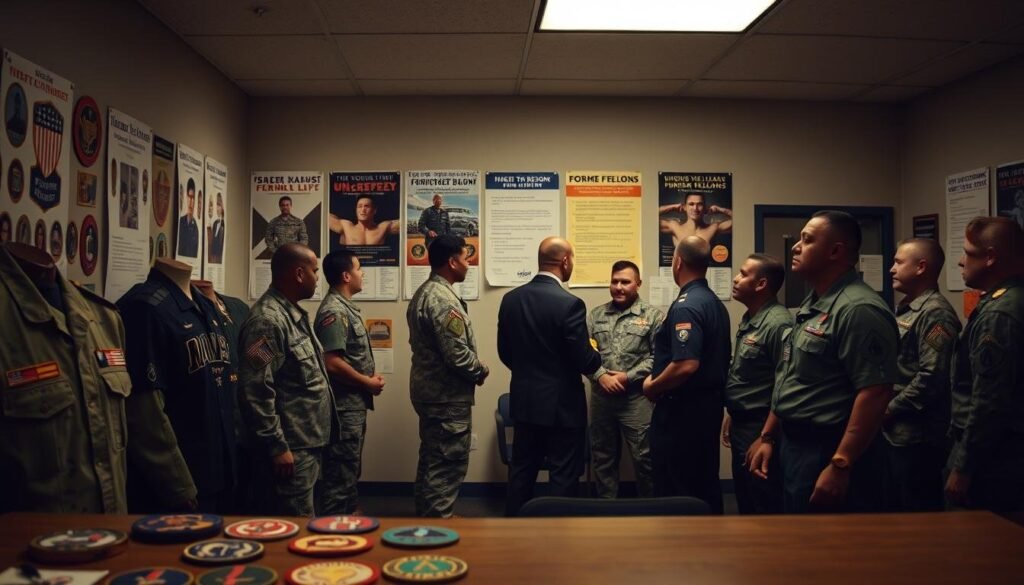Last updated on October 1st, 2025 at 07:01 am
Military Branches That Allow Felons to Enlist: Are you thinking about serving your country even with a felony? You’re not alone. Many with a criminal record want to join the military but aren’t sure if they can.
The good news is that some military branches are more open to accepting felons than others. While the military has strict rules, some branches might offer waivers or other ways in for those with a felony record.
It’s important to understand the rules of each military branch. Knowing your options and what you need to join with a felony is key.
Contents
- 1 Understanding Military Enlistment Policies for Felons
- 2 What Branch of the Military Accepts Felons
- 3 The Military Waiver Process for Felony Convictions
- 4 Preparing Your Application with a Felony Record
- 5 Conclusion: Military Branches That Allow Felons to Enlist
- 6 FAQ
- 6.1 Can I join the military with a felony conviction?
- 6.2 What is the military waiver process for felony convictions?
- 6.3 Which military branch is most likely to accept felons?
- 6.4 How do I prepare my military application with a felony record?
- 6.5 Can I join the military with a misdemeanor conviction?
- 6.6 Will a juvenile record affect my chances of joining the military?
- 6.7 How do I get a waiver for a felony conviction to join the military?
Understanding Military Enlistment Policies for Felons
If you’re a felon thinking about joining the military, knowing the enlistment rules is key. The military has strict rules for people with felony convictions. These rules differ between each branch.
The military looks at several things when deciding if you can join. They check the type of felony, how long ago it happened, and how you’ve acted since. The type of felony is especially important, as some are seen as more serious.
- The Army, Navy, Air Force, Marine Corps, and Coast Guard each have their own policies regarding felony convictions.
- Some branches may be more lenient than others, depending on the circumstances.
- A waiver may be required for individuals with felony convictions to be eligible for enlistment.
It’s vital for felons to understand these policies if they want to join the military. It’s not just about if you can join. It’s also about finding the branch most likely to accept you. Researching each branch’s policies can help you decide if you’re eligible and if you need a waiver.
Can felons join the military? Yes, but it depends on several factors. This includes the branch you’re applying to and the details of your felony conviction. [Military Branches That Allow Felons to Enlist]
What Branch of the Military Accepts Felons
If you’re a felon wanting to join the military, knowing the rules of each branch is important. The U.S. military has five main branches: Army, Navy, Air Force, Marines, and Coast Guard. Each has its own rules for people with felony convictions.

The Army is often seen as a good choice for felons. It has a waiver system that lets some felons join, based on their crime and the situation of their conviction.
The Navy also looks at each case individually. But, the Navy is pickier than the Army, and getting a waiver can be harder.
The Air Force has stricter rules, making it tough for felons to get in. But, some types of crimes might get a waiver.
The Marines have very strict rules. Felons might find it hard to join the Marines because they prefer people with clean records. [Military Branches That Allow Felons to Enlist]
The Coast Guard looks at each case differently. They consider the crime and how long ago it happened. The Coast Guard might be a chance for felons to serve.
Before choosing a branch, it’s important to know each one’s rules and waivers. This helps you decide the best branch for your military career.
In summary, while all branches might accept felons, the chances vary a lot. It’s crucial to research and understand these differences for a successful enlistment.
The Military Waiver Process for Felony Convictions
Having a felony conviction doesn’t mean you can’t join the military. The military has a waiver process for this. They believe people with past convictions can still serve honorably. But, they look at several things, like the type of felony and how long ago it happened.
The waiver process checks if your past actions fit with military service. First, you must tell about your felony when you apply. Then, the military decides if you need a waiver.
Steps Involved in the Waiver Process
- Disclosure: You must disclose your felony conviction during the enlistment process.
- Review: The military reviews your application to determine if a waiver is required.
- Waiver Application: If required, you’ll need to apply for a waiver, providing detailed information about your conviction.
- Evaluation: The military evaluates your waiver application, considering factors such as the severity of the felony and your conduct since the conviction.
Less severe felonies or those from a long time ago might be waived. The military looks for evidence of rehabilitation and a demonstrated commitment to a law-abiding life. For example, minor infractions or youthful mistakes might be viewed more leniently if you’ve been good since then.
Factors Considered for Waiver Approval
- The nature and severity of the felony conviction.
- The time elapsed since the conviction.
- Your overall eligibility for military service, including education, physical fitness, and background checks.
- Evidence of rehabilitation and personal growth since the conviction.
The waiver process is competitive, and approval is not guaranteed. The military wants people who can serve well and honorably. [Military Branches That Allow Felons to Enlist]
Understanding the waiver process and preparing well can help. If you have a felony and want to join, talk to a recruiter. They can help you through the waiver system.
Preparing Your Application with a Felony Record
To boost your chances of joining the military with a felony, prepare your application carefully. Be thorough, honest, and strategic in sharing your information.
First, gather all needed documents. This includes your felony conviction records and court documents. It’s important to be open about your past. Hiding or lying about your felony can get you disqualified right away.
When you fill out your application, give details about your felony. Talk about what happened and any good changes you’ve made since then. Showing personal growth and a positive move forward can help you.
| Step | Description | Importance |
|---|---|---|
| Gather Documents | Collect all relevant documents related to your felony conviction. | High |
| Be Honest | Be transparent about your past on your application. | High |
| Highlight Rehabilitation | Include any rehabilitation or positive steps taken since the conviction. | Medium |
By following these steps and presenting your application well, you can improve your chances of getting into the military with a felony record.
Conclusion: Military Branches That Allow Felons to Enlist
If you’re thinking about joining the military with a felony, knowing your options is key. Look into the Army, Navy, or Marine Corps. Each has its own rules and ways to get past felony convictions.
To boost your chances, be open about your past when applying. Make sure your application is strong. Getting help from a recruiter can also guide you through the waiver process.
Having a felony doesn’t mean you can’t serve. But, you need to understand the rules and hurdles. By being informed and taking the right steps, you can still join the military.
See Also: Can a Felon Become a Correctional Officer in Georgia?
FAQ
Can I join the military with a felony conviction?
It depends on the type of felony and the military branch you’re applying to. Some branches may consider your application with a waiver. [Military Branches That Allow Felons to Enlist]
What is the military waiver process for felony convictions?
The waiver process involves submitting your application with a detailed explanation of your felony conviction. The military then reviews your case to determine eligibility.
Which military branch is most likely to accept felons?
The Army is often seen as the most lenient branch for those with felony convictions. However, each case is reviewed individually.
How do I prepare my military application with a felony record?
Be honest about your record. Highlight any positive changes you’ve made since the conviction. Also, obtain letters of recommendation to support your application. [Military Branches That Allow Felons to Enlist]
Can I join the military with a misdemeanor conviction?
Misdemeanor convictions are generally viewed more favorably than felonies. Still, it’s important to disclose your record and provide context during the application process.
Will a juvenile record affect my chances of joining the military?
Juvenile records are typically sealed. But if they’re accessible, they may be considered during the enlistment process. Be prepared to discuss your record.
How do I get a waiver for a felony conviction to join the military?
To get a waiver, you’ll need to submit a detailed application. Include documentation about your conviction and any subsequent rehabilitation or positive life changes. [Military Branches That Allow Felons to Enlist]

Van Maldonado, born in California, holds a degree in Criminology and Police Science. Currently serving as an investigative officer at a local police station, he spends his leisure time writing insightful content for FelonScope.com.

